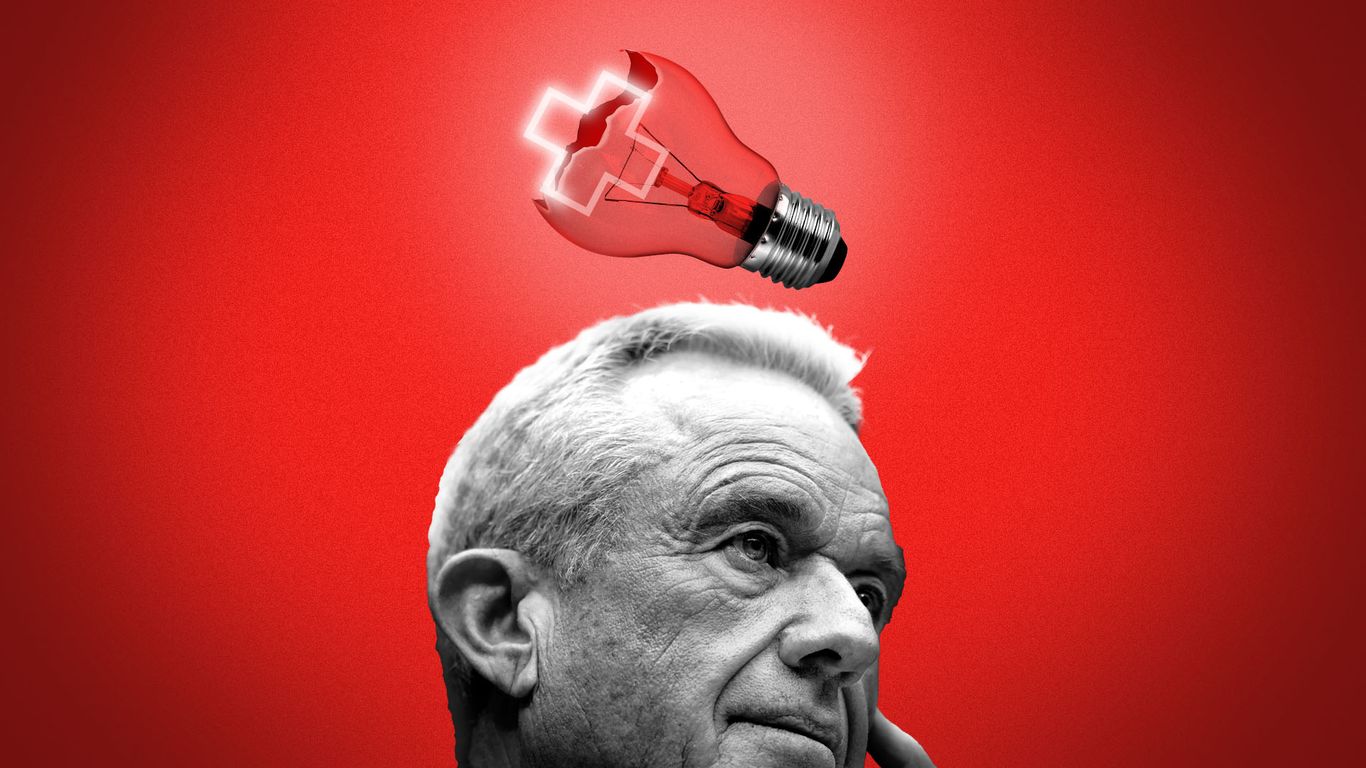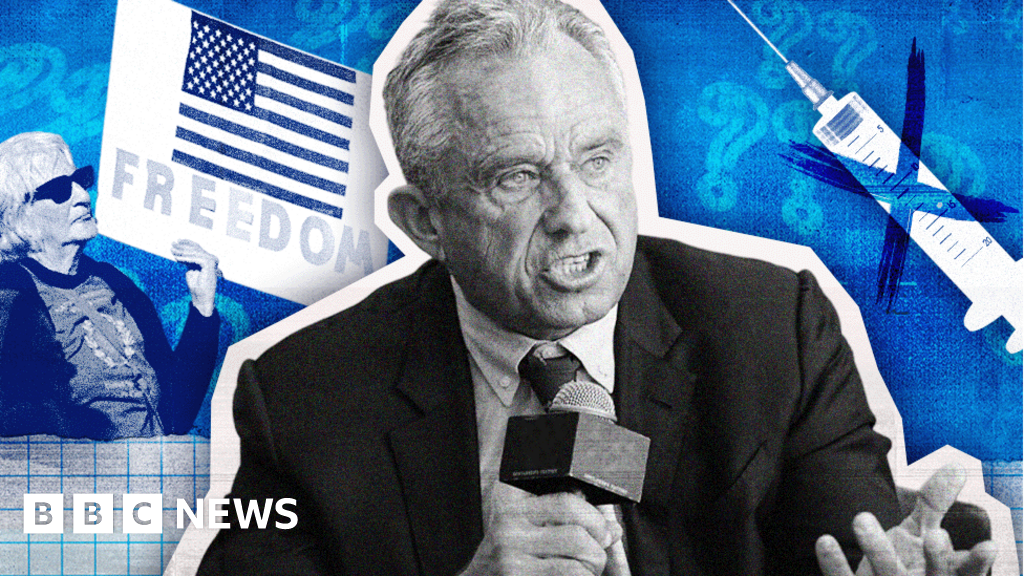The Controversy Surrounding the Cancellation of mRNA Vaccine Contracts

Introduction
NIH Director Jay Bhattacharya recently shed light on the cancellation of mRNA vaccine contracts, offering a different explanation from that of his boss, health secretary Robert F. Kennedy Jr. This decision has sparked controversy and raised questions about the public's trust in new vaccine technology.
Reasons for Cancellation
According to Bhattacharya, the decision to cancel the contracts was a result of the public's lack of trust in mRNA vaccine technology. This mistrust may have been fueled by the spread of misinformation and conspiracy theories, leading to hesitancy in adopting the new technology. In addition, the rapid development of the vaccines may have also contributed to the skepticism. This lack of public trust ultimately led to the cancellation of the contracts.
Implications
The cancellation of these contracts has significant implications for the future of vaccine development. With the rise of new technologies, it is crucial to address and combat misinformation and build trust in the public. This is especially important in the midst of a global pandemic, where the development of effective vaccines is crucial. By understanding and addressing the root of the public's mistrust, we can pave the way for the successful implementation of new vaccine technologies in the future.
About the People Mentioned
Jay Bhattacharya
Jay Bhattacharya is a medical doctor, health economist, and professor known for his work on health policy and the economics of healthcare, particularly concerning vulnerable populations. He holds an MD and a PhD in economics from Stanford University, where he completed all four of his degrees, including a bachelor's and master's. Bhattacharya is currently a professor of medicine at Stanford University, with courtesy appointments in economics and health research and policy. He directs Stanford’s Center on the Demography and Economics of Health and Aging and is a research associate at the National Bureau of Economic Research. He is also a senior fellow at the Stanford Institute for Economic Policy Research and the Freeman Spogli Institute, and has held fellowships at the Hoover Institution[1][2][5][6][9]. His research spans multiple disciplines, including medicine, economics, epidemiology, public health, and health policy, with over 165 peer-reviewed articles published. Bhattacharya has studied the impact of government programs, biomedical innovation, and economics on population health, especially focusing on aging populations and the well-being of vulnerable groups globally. Notably, he co-authored the Great Barrington Declaration in 2020, advocating for alternative COVID-19 policy approaches emphasizing focused protection instead of broad lockdowns[2][3]. In 2025, he was appointed director of the National Institutes of Health (NIH), the United States' leading biomedical research agency, marking a significant recent development in his career. Prior to this, he was affiliated with the USC Schaeffer Center as a nonresident senior scholar. His work is recognized for its critical examination of government health programs and biomedical research funding policies, including advocacy for innovation and critique of conservative funding approaches at NIH[3][4][7][8]. Born in Kolkata, India, Bhattacharya immigrated to the U.S. as a child and has been active as a free speech advocate and public intellectual in health policy debates[4][7].
Robert F. Kennedy Jr.
Robert F. Kennedy Jr. is an American politician, environmental lawyer, and author, born on January 17, 1954, in Washington, D.C. He is the third of eleven children of Robert F. Kennedy, the U.S. Attorney General, and Ethel Skakel Kennedy. His family's political legacy includes his uncle, President John F. Kennedy. Kennedy's early life was marked by personal struggles, including drug addiction, which led to his arrest for heroin possession in 1983. However, he later redirected his life towards environmental advocacy and public service. Kennedy graduated from Harvard University in 1976 with a degree in American history and literature and later earned a law degree from the University of Virginia in 1981. He began his career as an assistant district attorney in Manhattan but soon shifted his focus to environmental law. In 1987, he received a master's degree in environmental law from Pace University, where he taught environmental law from 1986 to 2018 and co-founded the Environmental Litigation Clinic. Notably, Kennedy is the founder of the Waterkeeper Alliance, a global clean water advocacy group, and Children's Health Defense, which focuses on childhood chronic diseases and environmental exposures. He has been recognized for his environmental activism, including being named TIME Magazine's "Hero for the Planet" for his efforts in restoring the Hudson River. Kennedy has also been involved in high-profile legal cases against companies like DuPont and Monsanto. In recent years, he has been a vocal figure in vaccine skepticism and public health controversies. In the 2024 U.S. presidential election, Kennedy initially ran as an independent candidate before endorsing Donald Trump. Currently, his involvement in public life includes controversial stances on health and environmental issues. Despite these controversies, his work in environmental law and advocacy has had significant impacts on public health and environmental protection.
About the Organizations Mentioned
NIH
The **National Institutes of Health (NIH)** is the United States government’s premier agency for biomedical and public health research, operating under the Department of Health and Human Services (HHS). Founded in 1887 as a small Hygienic Laboratory, it has evolved into the largest biomedical research organization globally, with a budget of approximately $48 billion and a workforce of about 18,700 employees[2][4][6]. NIH’s mission is to seek fundamental knowledge about living systems and apply that knowledge to improve health, extend life, and reduce illness and disability[2][6]. NIH is composed of 27 specialized Institutes and Centers (ICOs), each focusing on specific diseases or bodily systems, such as cancer, heart disease, infectious diseases, neurological disorders, and aging. Examples include the National Cancer Institute and the National Institute of Allergy and Infectious Diseases. These ICOs conduct research internally and fund external research at universities, hospitals, and private organizations through grants, making NIH the largest single supporter of biomedical research in the U.S.[1][2][7] A hallmark achievement of NIH is the Human Genome Project (1990–2003), which produced the first complete sequence of human DNA, revolutionizing genetics and medicine[2]. NIH research has led to landmark discoveries such as fluoride’s role in preventing tooth decay, lithium’s use in managing bipolar disorder, and the development of vaccines for hepatitis, Haemophilus influenzae, and HPV, impacting public health worldwide[4]. NIH maintains the National Library of Medicine, a leading medical information resource, and supports international research through entities like the Fogarty International Center, which fosters global biomedical collaborations[1][3]. Its Intramural Research Program is the largest biomedical research institution worldwide, employing thousands of scientists for basic, translational, and clinical research[4]. In business and technology contexts, NIH’s pioneering use of computing and data science to manage vast biomedical data sets drives innovation in health technologies and personalize
World Health Organization
The World Health Organization (WHO) is a specialized agency of the United Nations, established in 1948, with a mandate to promote global health, coordinate international responses to public health threats, and set standards for health policies and interventions[2]. Headquartered in Geneva, Switzerland, WHO operates in over 150 countries, working with governments, NGOs, and other partners to advance health equity, strengthen health systems, and respond to health emergencies. ## What WHO Does WHO’s core activities include monitoring global health trends, setting international health standards, providing technical assistance to countries, and serving as a forum for scientific and policy discussions on health issues[2]. The organization publishes influential reports such as the annual **World Health Statistics**, which tracks progress toward Sustainable Development Goals (SDGs) and provides a global “health report card”[1][8]. WHO also maintains the Model List of Essential Medicines, guiding countries on which drugs are most critical for public health[7]. In addition, WHO leads global campaigns on issues ranging from infectious disease eradication to noncommunicable diseases (NCDs), maternal and child health, and health emergencies[2][6]. ## History and Key Achievements WHO’s history is marked by landmark achievements, including the eradication of smallpox, near-eradication of polio, and the development of an Ebola vaccine[2]. The organization played a pivotal role in responding to the COVID-19 pandemic, coordinating global research, vaccine distribution, and public health guidance. In May 2025, WHO member states adopted the world’s first **Pandemic Agreement**, a historic step to improve international coordination and equity in future health crises[4]. WHO also spearheads initiatives like the Triple Billion Targets (healthier lives, universal health coverage, and protection from health emergencies) and technical policy packages targeting tobacco, alcohol, salt, and trans fat reduction[1][2]. ## Current Status and Notable Aspects WHO is currently implementing its **Fou

















